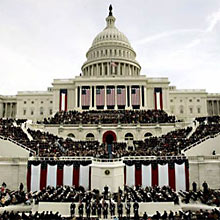
|
 |
 |
 Editorials | January 2005 Editorials | January 2005  
A Fire Is Lit That Could Burn Us, Too
 James P. Pinkerton - Newsday James P. Pinkerton - Newsday

Many say that George W. Bush is the political heir to Ronald Reagan. But as his inaugural speech showed, Bush owes more to a distant presidential predecessor, John F. Kennedy.


"While a lot of folks get offended that I talk about God, I don't think God gets offended." |
Reagan, in his 1985 re-inaugural, rambled through a historical anecdote about "a Boston lawyer named Adams and a Virginia planter named Jefferson" before he plunged into his main focus: economics. The Gipper rightly took credit for "25 straight months of economic growth" and pledged more pro-growth tax-cutting: "We must simplify our tax system, make it more fair, and bring the rates down for all who work and earn." It was not until the 30th paragraph of a 42-paragraph speech that Reagan turned his attention to foreign policy.

By contrast, Bush never mentioned taxes, nor did he touch upon many items in his domestic agenda. His immediate focus was foreign policy, and he got right to the point - and to the punch. Referring to the years between the fall of communism and 9/11 as "years of repose, years of sabbatical," he was taking a poke at the two presidents of the '90s, in effect accusing Bill Clinton and his own father, George H.W. Bush, of being on vacation as dire threats loomed.

But of course, Bush sees himself as more than just a mere counter-terrorist. We are led to "one conclusion," he declared: "The survival of liberty in our land increasingly depends on the success of liberty in other lands. The best hope for peace in our world is the expansion of freedom in all the world."

The Gipper, on the other hand, had ventured only a few such rhetorical flourishes. So the truest oratorical antecedent for the 43rd president is, in fact, the 35th president.

In his 1961 inaugural, Kennedy charged right into foreign policy, mixing global politics, military force and religion into a potent rhetorical brew: "The same revolutionary beliefs for which our forebears fought are still at issue around the globe - the belief that the rights of man come not from the generosity of the state, but from the hand of God."

Then came JFK's famous open-ended commitment to freedom around the world: "We shall pay any price, bear any burden, meet any hardship, support any friend, oppose any foe, in order to assure the survival and the success of liberty." His speech was devoid of any domestic political content whatsoever. And so the course of his presidency was set: In his brief term Kennedy confronted the Soviets in Europe, Fidel Castro in Cuba, and, most poignantly, the Viet Cong in South Vietnam.

Today, communism has mostly disappeared, but Bush has identified a new foe: "tyranny." The "t" word came up six times yesterday. "We will persistently clarify the choice before every ruler and every nation," he vowed, adding that "leaders of governments with long habits of control" should know that U.S. policy will be, at least implicitly, in favor of regime-change.

But even more than Kennedy, Bush sees his freedom crusade as being powered by faith. He cited "the truths of Sinai, the Sermon on the Mount, the words of the Koran."

Polls show that confidence in the Iraq war is slipping, but Bush has the bully pulpit, as well as the muscle to push events in a direction "set by liberty and the Author of Liberty."

In particular, Bush asked young people to "make the choice to serve in a cause larger than your wants, larger than yourself." Quote-meisters, of course, will compare this summons to JFK's ringing "ask not what your country can do for you - ask what you can do for your country."

This much is clear: like Kennedy before him, Bush aims to set American might in motion around the world. "By our efforts," he proclaimed, "we have lit a fire ... a fire in the minds of men." Those fires will surely burn - although perhaps in ways we can't yet imagine. | 
 | |
 |



